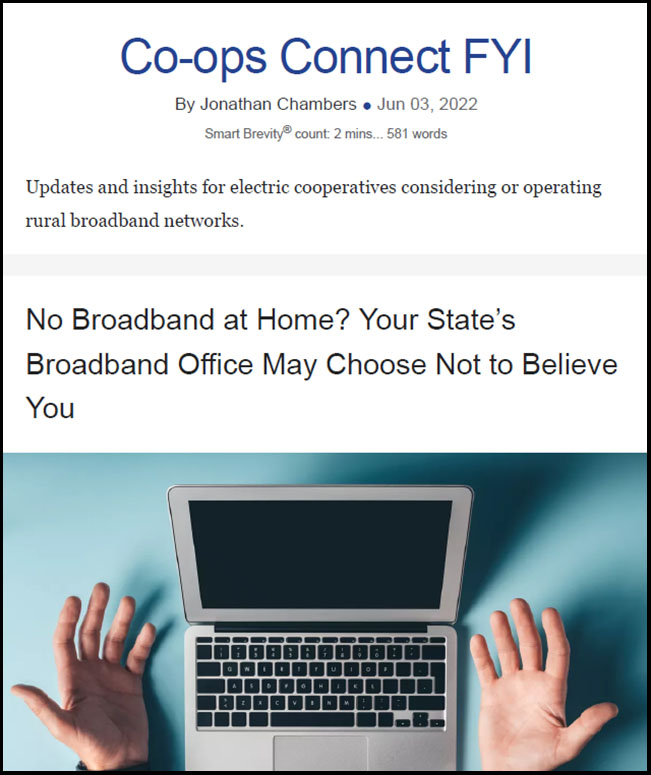No Broadband at Home? Your State’s Broadband Office May Choose Not to Believe You
June 3, 2022
Let’s recap:
Broadband in Bienville Parish, is nearly non-existent according to the FCC’s maps, NTIA’s maps, and the citizens of Bienville.
- One enterprising resident collected the sworn statements of 400 Bienville residents attesting to the lack of broadband availability.
- Broadband availability in Bienville Parish We used those sworn statements and NTIA’s maps to apply for a broadband grant from the GUMBO program.
- CSC Holdings, LLC, aka Suddenlink aka Cablevision dba Optimum, a subsidiary of Altice USA, protested the application, asserting that it does indeed provide broadband service.
So, who would you believe: the citizens of rural Louisiana or French billionaire Patrick Drahi?
- CSC provided only shapefiles and copies of its FCC 477 filings, which are census block-based and “claimed” speeds in excess of 25/3 Mbps.
More Bad News for Bienville
Last week, we received this FINAL decision from the Louisiana broadband office siding with CSC/Suddenlink/Cablevision/Altice USA. As to the sworn statements of the citizens of Bienville, the broadband office demurred:
“While sworn statements may offer beneficial feedback as to end-users’ satisfaction with current services or perceptions of what services are available, they indisputably do not provide any objective relevant data towards assessing whether internet access services in excess of 25:3 were or are available in the protested application area.”
Let’s ignore for a moment the Catch-22 of doing speed tests if broadband is unavailable or unaffordable at your home. Maybe a sworn statement is the best evidence you have.
The broadband office states that it reviewed speed test data from the Delta Regional Authority (DRA) and found four tests of Suddenlink customers in Arcadia, Louisiana, that exceeded 25/3 Mbps.
- Four tests. Not tests at any of the 400 locations where there are sworn statements. Just four random tests.
- The broadband office further explained that since Suddenlink uses a cable technology, it is presumed to provide service greater than 25/3 Mbps.
Go deeper:
Twenty-five miles due west of Arcadia is the town of Minden, also served by Suddenlink. The Delta Regional Authority published these speed test results by Suddenlink customers:
That’s:
- 14 Mbps down/1.04 Mbps up.
- 16.81 Mbps down/15.64 Mbps up.
- 15.93 Mbps down/19.38 Mbps up
- 17.11 Mbps down/7.88 Mbps up
- 18.8 Mbps down/6.17 Mbps up.
By the numbers: Not exactly 25/3 Mbps.
The Big Picture
Just for giggles, while writing this, I ran a speed test for my service.
I subscribe to Verizon FiOS 1 Gbps symmetrical service and I’m sitting in my library just feet away from the router.
I ran both an Ookla and an M-Lab test, since those are the ones NTIA uses for its maps.
I ran the tests one immediately after the other and then ran them a second time in reverse order.
Why it matters:
It doesn’t. Speed tests run this way are almost meaningless.
If a broadband office:
1. Isn’t going to produce its own maps
2. Will accept unverified household-by-household challenges to grant applications
3. Won’t accept the word of its citizens
Then: We’ll prepare for the battle of speed tests.
We have our own speed test servers.
We follow the FCC Office of Engineering and Technology speed test protocols for our federal funding.
We’ll work with local communities to help them withstand challenges to their grant applications.
The bottom line:
What a colossal waste of time, energy, and resources. While rural America waits.

